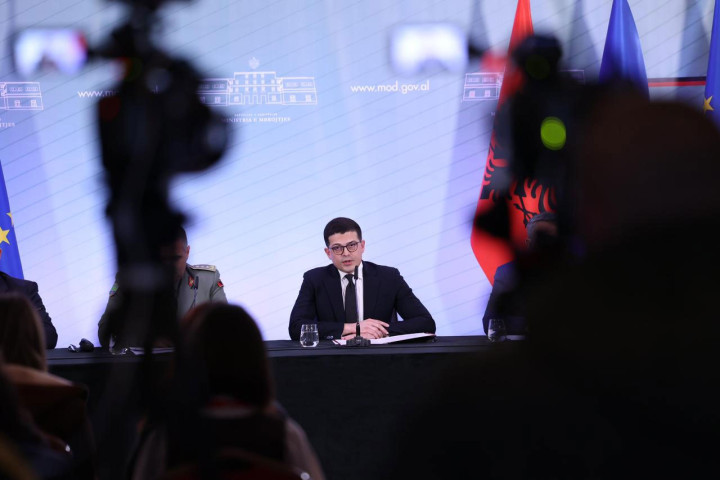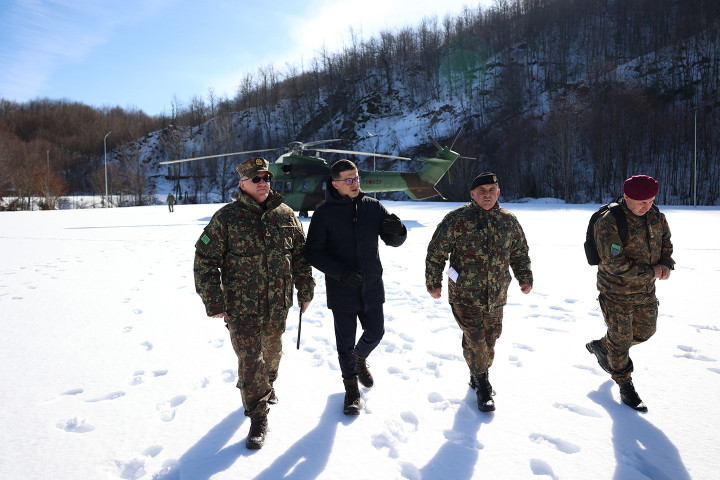Security in the Balkans, Xhaçka: Time to unite forces against destabilization attempts
-
Published: Wednesday, 22 May 2019 13:41

Defence Minister Olta Xhaçka participated in the international conference “Security Challenges in the Balkans and the role of external actors in the era of Euro-Atlantic transition”, organized by George C. Marshall Center for Security Studies, Albanian Policy Center and US Embassy in Tirana.
Minister Xhaçka stressed that the reason why the Balkans is in the focus of these efforts is comprehensible: “The Balkans are an easier target and the uncertain and destabilized Balkans means also a threatened Europe”, - she said.
Further on, Minister Xhaçka said that during these 10 years, undoubtedly assisted by its status as a NATO Member State, Albania has consolidated its role as a pillar of stability in the region: “With Montenegro’s membership in NATO and resolving the name issue between North Macedonia and Greece, and opening the way for our eastern neighbor to join NATO, of course we all feel more secure and immune to these influences nowadays.”
The conference was attended by the following guests: President of the Republic of Albania, Mr. Ilir Meta, Dean of the European Center George C. Marshall for Security Studies, Mr. Andrew Michta, Ambassador of the Federal Republic of Germany, Ms. Susanne Schütz, United States Military Attaché in Albania, Former President of the Republic of Kosovo, Ms. Atifete Jahjaga ect.

Below you can find the full speech of Defense Minister Olta Xhaçka:
Honorable ambassadors,
Dear alumni,
Honorable participants,
I thank you for the invitation to this conference and I want to congratulate you on the excellent work you continue to do in the field of Security Studies.
This conference deals with one of the most sensitive issues we face today as we work to guarantee the security of our countries.
I believe that today there is no doubt in the circles of those who have security issues in their profession, but also in academic circles, that our countries and our societies face a very real threat in the form of foreign influences, where they will I emphasize inter alia the efforts of Russia, which aims to penetrate not just in the political, economic or institutional circles, but also deeper in our societies and communities. These are efforts aimed at advancing agendas that are in conflict with our priorities and interfere with the European integration agenda and that essentially aim at weakening the foundations of the political, economic and social model we have chosen to build in our countries.
The recent events in one of the EU member states have clearly shown us that no one is immune to these efforts or influences. But as it is true that societies and countries with a much more consolidated democratic and political tradition than us have been vulnerable to these influences, it is also true that the Western Balkans, due to its geographical position, but also because of the history of its ethnic, religious and political heritage is the weakest link in the chain.
Therefore, if in the EU campaigns for exerting the influence have taken the form of “fake news” or attempts to fund extreme political groupings; in our region, attempts to extend influence have been far more flagrant and have reached attempts for coup d’état or open attempts to seize political and economic elites.
The reason why the Balkans is in the focus of these efforts is understandable. As I said above, the Balkans is an easier target and an uncertain Balkans, a destabilized Balkans, means also a threatened Europe.
But precisely in Europe, we shall research not only the motive but also the cause of the intensification of this campaign by these actors, or of these influences in recent years. Because, unfortunately, for a considerable amount of time, by consuming its attention and energies with the internal crises and starting to lose confidence in its enlargement, Europe has allowed a vacuum to be created in the Western Balkans where actors who do not want the Euro-Atlantic integration of the region incite or continue to extend their influence
20 years ago, it would have been unimaginable that, for instance, a country like Russia, which we hear a lot about, could destabilize the Western Balkans region and become into a rival or a threat to the European Union, or not? If today we seriously discuss the destabilization risk of our region as a result of Russian interventions, this is explained by the fact that many citizens throughout our region today believe they live in an unpaved, isolated pocket where the European perspective has begun looks like a beautiful dream, but a very distant one.
During these 10 years, Albania has undoubtedly been helped by its status as a NATO member state and has consolidated its role as a pillar of stability in the region. With Montenegro’s NATO membership and resolving the name issue between North Macedonia and Greece and opening the way for our eastern neighbor to join NATO, of course, nowadays we all feel more secure and immune to these influences.
The decision to build in Albania, in Kuçova, the first NATO air base in our region, is undoubtedly a strong signal of the Alliance’s determination to stay in the region but also a strong signal of strategic importance which the Western Balkans region is receiving, in relation to guaranteeing Europe’s security.
It should also be noted that because of history, Albania and the Albanians are probably the only people in our region who enjoy a pretty strong immunity to the efforts of these various actors, especially Russia, which we often hear to extend its influence here.
But it is also a fact that the involvement of these actors in the Western Balkans continues to be very strong and the most worrying is the fact that the main objective they have chosen to advance their geopolitical agenda by is to promote instability in our countries, where nowadays there exist peace and an insight, as a result of a deepening of cooperation and exchanges, but where these achievements still continue to be fragile.
It has to do with a well-thought, well-planned, well-managed and well-funded effort to destabilize the Western Balkans, thus paving the way for, on the one hand, the further penetration of these influences and actors in the region and, on the other hand, the weakening of EU security. It is an attempt that has taken the form of a frontal hybrid attack on the arsenal of the instruments being used; instruments that go from economic incentives to the use of communication media through disreputable “fake news”, which aim at weakening citizens’ confidence in the democratic model or promoting ethnic, religious, social or political tensions, and, as I said earlier up, in an extreme case, it was reached up to a Coup Attempt to a candidate country for NATO membership at the time.
Certainly, despite Albania’s determination, or of other countries in the region, it must be underlined here that the citizens of a large part of the region occasionally have voted forces that have opposed these efforts, this is a threat that we cannot address alone.
That is why I believe that today is a moment to unite forces to counter these attempts together. This unity of power can come in two forms: first, by formulating a clear strategy for the Western Balkans and the entire region by NATO, which in fact is missing today; and secondly, what I believe is even more important, accelerating the integration of the entire region into the European Union.
Ensuring the security of the Western Balkans, consolidating democratic achievements and peace and stability from any challenge cannot be attained as long as our region remains as an isolated and unpaved pocket in the middle of the European Union space. This kind of vacuum has been and will remain an invitation for EU rivals, NATO rivals to extend their influence here, so we all have to work together to prevent it from happening.
Articles from Newsroom
Monday, 26 January 2026



Defence Minister Vengu hosts Belgian counterpart: Cooperation to strengthen our capabilities
Tuesday, 20 January 2026
Albanian Air force trains with the U.S. Air Force, focusing on rapid crisis response
Monday, 19 January 2026